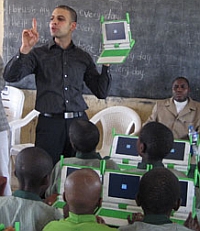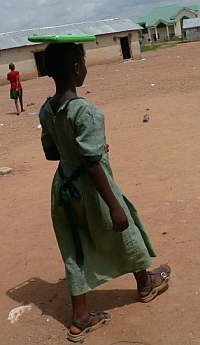I am Steve Cisler, and in 2005 I wrote the following piece which was published in the Journal of Community Informatics.
It reflected some of my own experiences in the life cycles of ICT projects in developing countries (and some in places like Silicon Valley, too). As the pressures on the One Laptop Per Child project increase and sales projections are reduced, I hope the XO-1 computer won't follow the path of the Simputer.
I'd hope a well-balanced movie about the One Laptop Per Child project would not end as this one does.
A short movie about ICT
The current Harper's magazine has an article called "Valkyries over Iraq: the trouble with war movies." It discusses the making of Jarhead (a movie about Gulf War I, opening Friday in the U.S.) and how soldiers form their view of war from their memories of war movies, including anti-war films like Apocalypse Now and Deer Hunter.
I began thinking about a documentary that would never be made: the life of an ICT project. It is of little interest to most people, any more than a movie about plumbing would capture a large audience. But we are a small, specialized audience so come into the viewing room. This is a rough cut...
The movie begins with an office scene: a few program officers sitting in a meeting room in Ottawa or Washington or London or The Hague or Geneva. It's getting near the end of the fiscal year, and there is some money left in their budget for another pilot project. They know that if it is not spent, it will be hard to justify an increase for their agency in the next budget cycle.
One officer who has attended many conferences on poverty and knowledge management and ICT says he'll make some calls to people who might have some good ideas. Another officer has spent time in short visits to poor countries, including the handful blessed with substantial existing project funds from her agency.
The country she has in mind is of strategic importance to her government either because the president has changed his ways and has renounced corruption, is on a path to democratic elections, has opened its markets to firms from abroad, or has agreed to joint military exercises in the north of his land.
What follows are short scenes of non-profits and contractors pitching ideas to the program officer: a wireless network for indigenous groups, a mobile computer lab, barefoot doctors with PDAs in favelas, a literacy program using a new cheap computer with a no-cost operating system. The most appealing ideas happen to be for places in Asia and Latin America, but the agency is focused on Africa.
The chosen NGOs oblige and submit two-page proposals for pilots in Africa. After a quick turnaround and a nod of tentative approval from the program officer, the NGO contacts a local "champion" or consultant in-country. Everyone is enthusiastic about the idea of a new ICT pilot project. New technology, more money to spend.
The local contact meets with an underling from the Minister's office. This person is neutral about ICT and is more focused on surviving within his government bureaucracy, but he assures the champion that the ministry will offer staff and in-kind support. A final proposal is written.
The NGO and the government work out a budget to use up available funds. Computers, Internet connection fees, a new Land Rover, travel expenses (in-country and for a few international conferences), training for the people involved, and an evaluation by a consultant from the donor's country. The software will be open source or pirated.
Scenes of the Land Rover loaded with new gear (customs had to be given something extra to clear the shipments) headed into a rural village or urban slum. Young people carrying the gear to the school, community center, health clinic.
Celebrations: dances, speeches by the donor, the mayor, the minister, a ribbon cut. Then training classes. Intense focus on the instructor. Excited faces gathered around the computer screens. A good start.
The project has lift off. High demand, not enough places for everyone. Yet there are problems. The town/barrio leader puts one of the computers in his house "to prevent theft." Electricity is a problem. The computers sometimes sit idle until the NGO provides a backup generator using expensive fuel. Still, the project is making an impact. Theft is not a problem. The locals have "taken ownership."
Young people testify to the changes it is making in their lives. A professional demonstrates how he is less isolated now that he can communicate with colleagues. A farmer shows what he has learned about a crop, a sick animal, an insect infestation. The project hums along...
The NGO representative begins to worry about where money will come from to keep the project going. In spite of the perceived benefits, the ministry is not interested in budgeting to support the project. There are arguments among the parties: the donor country, the NGO, and the ministry.
The ministry wants the donor to extend the funding. The donor says no. The locals are encouraged to come up with a plan to raise some money. There is talk of matching funds, but locals have a lot of energy and little extra money and what they raise is not sufficient.
They enter ICT contests in distant lands, hoping for recognition. They hear of other grants but don't have the resources to apply. The pilot project is winding down. Priorities have changed and the funding agency is now concentrating on some new aspect of ICT.
The NGO follows the money and prepares the transition from the current project. The locals find money to pay a former student to take over the project. He dreams of working in the capital but will take this position for a while.
The computers are showing their age. The dust and heat are taking a toll. Most are still working at the end of the project. Others sit in a back room. There is no money for repairs or for the Internet connection any more. The Land Rover is now an addition to the ministry's motor pool. The evaluator has come and gone. Her report sits in the inboxes of the program officer, the NGO, and the minister's liaison. New pilot projects are being hatched.
Back in the village or barrio the project building is dark. The doors are locked most of the time. A girl is sitting at a table in her kitchen. In her school copybook she is writing her email address over and over, just so she won't forget.
Maybe she will go online again some day and see if her new friends in the capital and in Canada have written her. It might happen, but the fiscal year is coming to an end. New projects are coming.
Steve Cisler is a librarian who lives in Silicon Valley. He ran a grant program at Apple Computer and has worked on projects in the rural U.S., Latin America, Uganda, Jordan, and Thailand.






OLPC is XTC for TECHNOSCHIZZO'S in pursue of technical and price benchmarks started by a gentleman who started something without any consultation or invitation with those for who it was concerned. From day 1 he ended up on the wrong side of the road claxonning at everything coming his way.
A pathetic group of followers blindly intoxicated with no knowledge nor considerations about the sense or nonsense nor wondering what is the difference between "meaning well" and "doing well" and creeping over eachother to get a glimpse at a lunchbox lookalike which would perform miracles once unleashed.
The discussion about OLPC is a disgrace, in the first place because of lack of respect and openess by Mr.Negroponti himself who made it perfectly clear sofar the project is not about kids or Digital Divide but all about him.
The damage he is inflicting on developing nations can't be categorized as a crime but the level of damage by the setback he is creating is sad, and can't be stopped nor adjusted by those he claims to cater for.
To get things going in developing countries is of a complete different level of issues and problems to be adressed and tackled and failing to take them into consideration will keep the whole discussion around the issue of a 0 relevance level as Negroponti is not willing to admitt his egocentric stupidity nor his followers willing to ask critical questions.
Buying 2 OLPC's is not in the best interest of kids and the claim itself of a questionable level and the sooner he stops his personal involvement the better.
Bash Bash Bash.
Lets all jump up and down and shout out why this project wont work.
Its far easier to be negative than positive isnt it. Steve wrote a lovely story two years ago and somehow its supposed to have relevance today.
What people are seeing is the cause but missing out on the effect. Finally something is being done on a World Wide Scale to help the poor out of the never ending cycle of poverty. People living in third world conditions are starting to have hope by discovering what they could have.
An email address is a good start.
I do believe Steve's piece is pretty relevant. Robert, a lot of things have been to help the poor out of the never ending cycle of poverty. This particular initiative may well be the first of its kind, but lessons learned from previous attempts, many of them as well meaning and well (or better) supported ones that haven't managed to end poverty should be heeded. What Steve is bringing to the discussion is valid and shouldn't be dismissed just because it doesn't applaud or praise OLPC.
@Peter: It is a bit unfair to criticise Mr.Negroponte this way. Although I agree that he is making mistakes (e.g.: b1g1 instead of simply selling the laptop with some premium in the developed world), he has benn running a project which has created a lot of value.
@the story:
I see positive things in OLPC compared to Steve's story. For example: the water and dust resistant design of the XO. These laptops will not stop in 6 months due to failures from dust and/or humidity. The lack of electricity will also be taken care of when the pedal and the stretching generators come out for the XO (they are pretty overdue now).
The OLPC project was certainly looking out for previous errors.
When Steve's "ICT Movie" article came out, I can remember a few dozen people emailing it to me all commenting on how it was a perfect, if sad, representation of too many ICT projects. Projects I've seen in the field both at start and after the funding ended.
The latter scene is not pretty, and its also a scene I worry about with OLPC. Right now there is much hoopla and cheer. But what about 5 years from now. Will we still remember OLPNC School Galadima? Will they still be using OLPC's?
Steve's story should make us all remember that while we may be focused on another shinny, flashy thing in 2012, the children and parents of Abuja will have little green reminders of ICT in their town still.
Let us hope that the reminders are happy, smart kids with XO-3's, not broken ears or worse, broken promises and broken dreams.
This ICT story is much too familiar. Think fishing boats, fish processing plants, and no electricity. Wells without parts.
What this story does show too is to what extend the OLPC has gone to prevent these disasters. The XO is designed from the ground up for children in the developing world. Its design embodies everything that is known about how technology functions in the developing world. Not everything is know about technology in the developing world, so there are bound to be mistakes.
This story also gives new credibillity to the 1 million+ order size. If every village is saturated with laptops, it becomes extremely difficult to desert them. It is something to deny villagers a luxury neighboring villages don't have. It quite another thing to deny them what other all have. Keeping up with the Joneses is a human trait.
Furthermore, the large order size binds politician's careers to the success of the project. And it creates "markets". Markets for internet access and many commercial opportunities. Think a product market for your region (walking distance)? For small farmers, knowing city crop and food prices gives a much better bargaining position against buyers. Weather forecasts can save lives and money. Better communication has ALWAYS improved economic productivity.
So to me, if anything, it gives me more convidence that the OLPC actually learned from the past.
Winter
This is a great thing you are doing. Just saw your story on 60 minutes. You should be awarded the Nobel Peace Prize. This is truly a great humanatarian effort. I'm ordering !